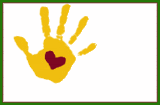If you are a parent with a child with Down syndrome (Ds), you might know our kiddos show higher rates of challenging behaviors than their typically developing peers. Challenging behaviors common to children with Ds include wandering, attention difficulties, inappropriate social behaviors, noncompliance, and compulsive behavior.
Did you know that many children with Ds do not respond to typical parenting styles? As parents, we often use negative consequences (time-out, spanking, punishment) for inappropriate behavior.
In many cases, using negative consequences with the child with Ds can exacerbate behavior issues!Reagan was one of these kids. Like many children with Ds, she has quite the delightful personality. She is kind, thoughtful and affectionate most of the time. She is right there when someone is in need to offer her love and support. I don't think she has a malicious bone in her body but we have faced many challenging behaviors. Challenging behaviors in children with Ds tend to be complex in nature - related to processing/language difficulties, fear of failure/motivation, cognitive issues, lack of choices, etc.
For Reagan, the most challenging behaviors stem from her highly stubborn nature. I think every parent of a child with Ds deals with what appears to be an exaggerated stubborn streak. Negative consequences did nothing to change her patterns of behavior.
As a homeschooling parent, I took our discipline issues very seriously. After all, without control of challenging behaviors and discipline (on all parts) we cannot effectively educate our children at home. Reducing challenging behaviors had to become a priority if we were to continue on our homeschooling journey.
In my research, I found that
children with Ds respond better to positive behavior supports which encourage appropriate behaviors. Little things like sincere praise, positive attention to appropriate behaviors, and rewards made a huge difference in effecting changes in behavior.
My parenting patterns had to change to effect changes in Reagan’s behavior. I had to be much more creative in parenting this child to make our home environment more conducive to learning and her behavior outside the home socially acceptable so that learning and social opportunities were more available to her.
I learned about looking at behavior in the context in which it occurs. I learned about
A-B-C (Antecedents – Behavior – Consequences) patterns to look for ways to effect changes in behavior.
I learned that ridding a child with Down of problem behaviors often takes more learning trials than it would with a typically developing child.
I learned that you must teach the child exactly what you expect. Most young children with Down syndrome learn little incidentally (by example) - appropriate behavior must be explicitly taught and modeled. Skill building vs. trial and error which can lead to frustration and even embarrassment!
The younger child may benefit from a pictorial guide to refer to when placed in known difficult situations as a reminder of what is expected. In the school age child,
social stories are often used to teach social skills to children with special needs but can be adapted to address challenging behaviors in the child with Down syndrome. They are easy to create on a word processor and can be tailored to the unique needs of the child.
I also ran across a book that I recommend to every parent with a child with special needs,
Steps to Independence, Teaching Everyday Skills to Children with Special Needs, by Bruce L. Baker and Alan Brightman. This book not only speaks to skill development but has several chapters devoted to behavior and positive behavioral support. The book does not specifically target children with Ds but I have found it to be an invaluable resource!
At 14, Reagan understands negative consequences and I use them effectively as necessary. In the real world there are negative consequences for inappropriate behaviors so she finds them at home too. I think maturity has made a huge difference in her ability to understand the consequences of her behaviors and increase her compliance.
Homeschooling Reagan at home has been quite beneficial in ridding her of challenging behaviors. She is in an environment where behavior issues can be dealt with immediately and consistently. As she has matured and her language comprehension increases, we can discuss various choices she has as she problem solves and the consequences of her actions. She gets plenty of time out in the community - more opportunities for working on developing proper behavior and social skills. At times it has been exhausting - especially in the early years - but definitely well-worth every ounce of effort! She is growing into a lovely young lady.
Reagan, like most of us, is still a work in progress. We continue to work on appropriate behaviors and social skills in the home and around the community. It is said that good behavior and social skills are the keys to success for adults with Down syndrome so we continue working to become the best we can be!












































